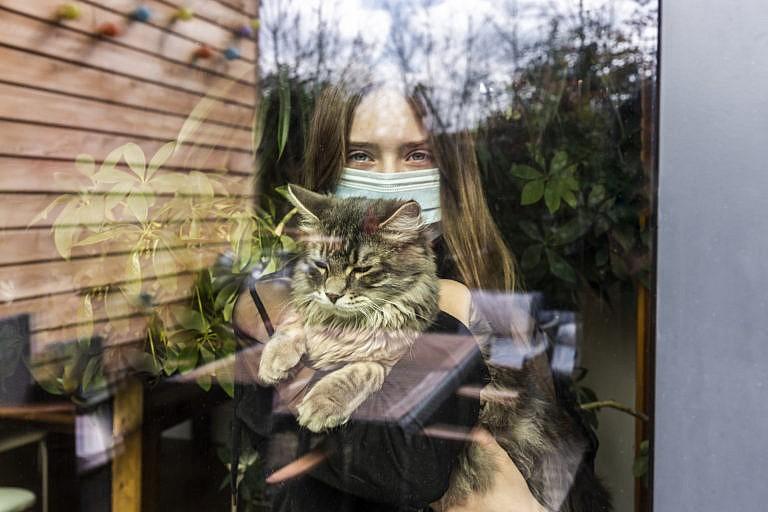Lessons from the pandemic: How much can we handle?
Jillian Horton: As we try to cope with our own fear and uncertainty, perhaps our greatest challenge is helping our children learn to live with it too

(Getty Images)
Share
Jillian Horton is a Canadian physician and writer. Her forthcoming memoir, We Are All Perfectly Fine, will be published by HarperCollins Canada in February 2021.
When I was a kid, I wanted a dog. When I say “wanted” I mean my whole being was focused on acquiring a dog, that a dog occupied my thoughts in a way that was just short of a diagnosable disorder. I argued the moral case for a dog; I opined the health benefits of a dog. I wrote poems, limericks and comic strips featuring dogs. But my campaign failed. I had two disabled siblings, and my parents insisted we were already maxed out, that caring for a dog would tip us over the edge.
And yet, it turned out my parents weren’t entirely unsympathetic. One day I came home from school to find a wooden hutch in the back yard. Inside, my consolation prize: a quivering rabbit the size of a snowball, who eventually grew into a corpulent white oval with pink-rimmed eyes and a fetish for electrical cords.
I loved that fat white rabbit. I spent hours lying with him in the grass, plying him with carrot and apple until he got even fatter. When I went away to university, my mom took over his care. She brought him indoors when the temperature dropped below freezing, letting him scamper around the house. My Dad procured his hay. My sister, who had no short term memory after a brain tumour, would lie on her stomach and try to entice him out from under the bed, shouting terms of endearment. The rabbit’s care buoyed everyone a little bit; it became a family affair.
That spring, when my first year of university was almost over, I called my mom. “How’s my rabbit?” I asked. She paused, then revealed that a few nights earlier she’d found him dead in his hutch. “Dad didn’t want me to tell you,” she said. “He thought it would upset you while you were writing your exams.”
That’s still the part of the exchange I remember best: My parents thought a dead rabbit would tip me over the edge. Our family’s origin story was like an Oscar montage of catastrophes—a sister with cancer, a brother with schizophrenia—and I’d had a lot of time to flex my muscles when it came to processing loss. I’d grown up in the shadow of illness. I knew an unforeseen dark horseman could arrive at any time and torch a carefully planned life. If all that work and love could be so easily levelled by one good kick from fate, part of me wondered if it was a waste of time. So I lived with tempered expectations, ones that were often easy to exceed. I was apprehensive to have children, amazed when they were healthy. I’d been afraid of all that risk. But with time and experience and eventually a regular, healing mindfulness practice, I learned to live with it.
Last year, out of the blue, my sons started a campaign for a dog. They greeted all the neighbourhood pups with purposeful looks and long, backward glances. I love dogs too, I told them. But I was travelling a lot; dogs need stability. I’m sure I mumbled some version of the same thing my parents had said to me years ago: “Dad and I have all we can handle right now.”
Then COVID hit like a meteor. Suddenly everyone had more than they could handle. Many people had more than anyone should have to handle. The old dark horseman had arrived.
It wasn’t an original idea, but it came to me in the early days of the pandemic: This was our window to get a dog. Soon after, my husband walked through our front door with a cottony pup who looked like the bloom of a hydrangea. Our sons shouted and cried with joy. They asked what kind of dog she was and what she would like to eat . Nobody asked how we could handle more responsibility in the middle of a pandemic.
My sons have excelled in caring for our dog. She has given them the gift of structure, their days interspersed with walking her and fawning over her needs. They carry her around like a baby, her paws over their shoulders, her tongue grazing their cheeks.
One day, on a walk, my middle son asked me, “Can dogs get COVID?”
Yes, I told him, it seems like they can.
“But can they die of COVID?” he persisted.
I knew exactly who he was seeing out of the corner of his eye: the dark horseman.
I always thought my parents were resistant to the idea of me getting a dog because they didn’t think I could handle any more responsibility. They were maxed out; they thought I was too. And maybe what they really thought was that I couldn’t handle any more loss.
But nobody is born knowing how to handle loss. We’re living through a time when every sentient being is afraid of losing something they love, and some will lose far more than others. We fortify the frontlines or work behind the scenes, we care for our neighbours, we challenge ourselves to address systemic injustices. But when that work is done at the end of the day, what else is there to do but sit with our fear, and teach our kids how to sit with it, too? There will always be a horseman; love will always be a risk. But I am not yet maxed out. And I know how not to waste this time.